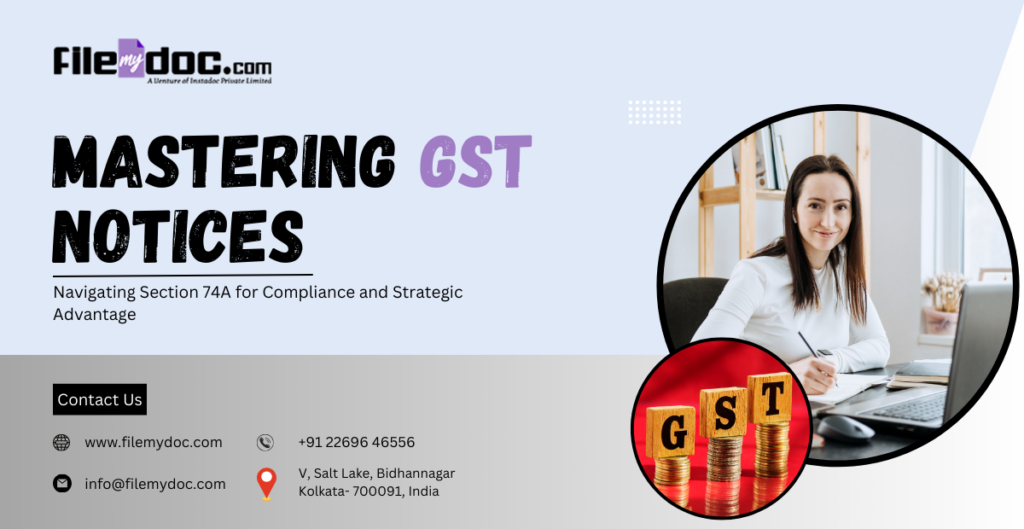Mastering GST Notices: Navigating Section 74A for Compliance and Strategic Advantage
The Goods and Services Tax (GST) regime has introduced various compliance challenges for businesses across India. Among these challenges, managing GST notices under Section 74A has become a critical aspect of maintaining regulatory compliance and safeguarding business interests. In this article, we will explore the intricacies of Section 74A, the implications of GST notices, and how businesses can strategically manage these notices to their advantage.




Understanding GST Notices under Section 74A
Section 74A of the GST Act deals with the issuance of notices for tax evasion, fraud, and willful misstatement by businesses. These notices are typically sent when the tax authorities suspect that a business has intentionally avoided paying taxes or has engaged in fraudulent activities. The consequences of receiving a GST notice under this section can be severe, including penalties, interest, and potential legal action.
Key Elements of Section 74A
To effectively manage GST notices under Section 74A, it is crucial to understand the key elements of this section:
- Initiation of Proceedings: GST authorities can initiate proceedings under Section 74A if they believe that a business has evaded taxes or committed fraud. This can happen based on discrepancies in tax returns, audits, or information received from third parties.
- Burden of Proof: Under Section 74A, the burden of proof lies with the tax authorities. They must establish that the business has committed tax evasion or fraud. However, businesses must be prepared to present evidence and documentation to refute the claims made in the notice.
- Time Limits for Issuance of Notices: GST notices under Section 74A must be issued within five years from the end of the relevant financial year. Businesses should be aware of these time limits to ensure that any notices received are valid and within the prescribed timeframe.
Strategies for Managing GST Notices
Receiving a GST notice under Section 74A can be daunting, but businesses can adopt several strategies to manage these notices effectively:
- Thoroughly Review the Notice: The first step in managing a GST notice is to thoroughly review its contents. Businesses should carefully examine the allegations made by the tax authorities and assess the accuracy of the information provided. This will help in formulating an appropriate response.
- Gather Supporting Documentation: To effectively counter the claims made in the notice, businesses should gather all relevant documentation and evidence. This includes tax returns, invoices, payment records, and any other documents that can demonstrate compliance with GST regulations.
- Seek Professional Assistance: Managing GST notices can be complex, and it is advisable to seek professional assistance from tax experts or legal advisors. These professionals can help businesses understand the legal implications of the notice and provide guidance on how to respond effectively.
- Timely Response to Notices: It is essential to respond to GST notices within the stipulated timeframe. Delayed responses can lead to further penalties and legal complications. Businesses should ensure that their response is well-drafted, supported by evidence, and submitted on time.
- Implement Compliance Measures: To prevent future GST notices under Section 74A, businesses should implement robust compliance measures. This includes regular audits, proper record-keeping, and continuous monitoring of GST returns. By maintaining a high level of compliance, businesses can reduce the risk of receiving such notices.
Leveraging Section 74A for Strategic Advantage
While GST notices under Section 74A can pose challenges, they can also present opportunities for businesses to strengthen their compliance framework and gain a strategic advantage:
- Identifying Weaknesses: GST notices often highlight areas where a business’s compliance practices may be lacking. By addressing these weaknesses, businesses can improve their overall compliance and reduce the likelihood of future notices.
- Enhancing Reputation: By proactively managing GST notices and demonstrating a commitment to compliance, businesses can enhance their reputation with tax authorities and stakeholders. This can lead to a more favorable relationship with regulatory bodies and potential customers.
- Strategic Audits and Reviews: Conducting regular audits and reviews in light of Section 74A can help businesses identify and rectify issues before they escalate. This proactive approach can safeguard the business against future tax-related challenges.
Conclusion
Navigating GST notices under Section 74A requires a strategic approach and a thorough understanding of the legal framework. By reviewing notices carefully, gathering supporting documentation, seeking professional help, and responding timely, businesses can effectively manage these notices and mitigate potential risks. Moreover, leveraging the insights gained from these notices can provide businesses with a strategic advantage, allowing them to strengthen their compliance measures and enhance their reputation in the market.


























